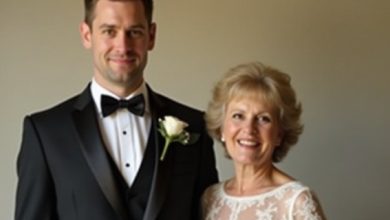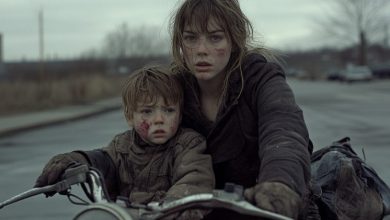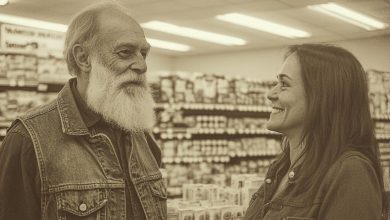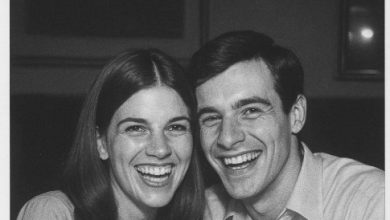Adults neglect Grandpa’s brush-covered grave, boy clears it and discovers inscribed coordinates.
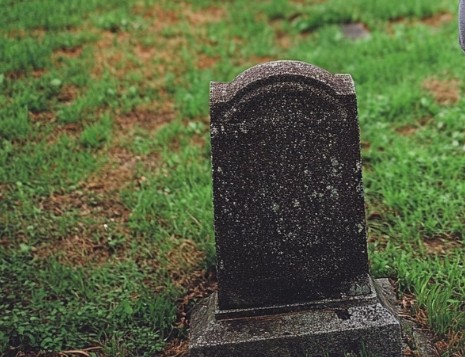
Liam was only eighteen, yet the weight on his chest felt older than time. On a cool autumn afternoon, crisp leaves waving in the wind, he walked through the old town cemetery. Tall trees whispered overhead, and small birds picked at dry grass. Liam carried a fresh bundle of white roses in one shaking hand. Each step across the soft earth pulled him back to every memory of his late Grandpa Robert—warm stories by the fire, dusty afternoons in a garage, and the gentle smell of wood shavings mixed with engine oil. He had come to say goodbye. His family was leaving town in just a few days, and the thought of tearing up his roots felt like ripping pages from a book he had not finished reading.
When Liam reached the weather-stained headstone, he knelt and laid the flowers on the gray marble. His voice cracked as he spoke. “Grandpa, I’m here to tell you the news,” he whispered. “Dad lost all our savings on card games. We have to move into a small trailer fifteen miles west. Dad says I’ll work at a repair shop, fixing cars for extra cash. That means my dream is gone. I won’t design planes or fly across oceans. My plan is over before it ever began.”
A tear rolled down his cheek. He used his sleeve to wipe it, then brushed moss away from the stone. The soft green layer peeled off in clumps, revealing lines Liam had never noticed. He leaned closer, puzzled. There, sneaking through the marble, was a line of strange numbers separated by dots and commas. He blinked and read them again. They were not random scratches. They looked like coordinates, similar to the puzzles Grandpa once made for their weekend treasure hunts.
Liam’s heart thudded. His grandpa had always loved clever games and secret clues. “Could this be another one?” he wondered. His phone buzzed in his pocket, and he opened a map app. He typed in the numbers. The screen pinned a spot in town—an old railway station’s cloakroom. The place lay only a short bicycle ride away.
At first, Liam thought somebody must be joking with him. But he knew nobody else would carve such a code. He stood, brushed dirt from his jeans, gripped his bike handles, and pedaled down the winding road. The wind rushed past his ears, filling them with a single idea: Grandpa had something important to show him.
The stone railway station was quiet when Liam arrived. Sunlight filtered through dusty windows, turning the air golden. He walked to the front desk, nerves fluttering in his stomach. “Good afternoon,” he said to the clerk, a woman wearing old-fashioned glasses. “Do you have any lockers under the name R. Hudson?”
She flipped through a worn logbook, humming softly. “Yes,” she replied, pointing. “Locker four-one-seven. It’s been rented for a little over a year, sir. Combination lock.”
“Thank you,” Liam said, voice shaking. He hurried to the baggage room, a place that smelled of forgotten suitcases and cool concrete. Locker 417 stood in a dim corner. The dial waited for numbers. Liam spun it left and right, trying birthdays, anniversaries—nothing worked. He sat on the floor, head in his hands, feeling the bite of failure.
Just then, an airplane’s faint roar rumbled overhead. Liam looked up as if the ceiling might open. Suddenly a memory flashed: his first wooden toy plane, painted blue and red, bore the model number L-1717. Grandpa had burned those digits into the tail with a soldering iron, saying, “One day, real planes will carry your name.” Liam jumped to his feet, breath quickening. He spun the dial: 1-7-1-7. Click. The metal door slid open.
Inside lay neat stacks of hundred-dollar bills tied with rubber bands. Beside them rested a thin, worn diary with a brown cover. Liam’s fingers trembled as he lifted the book. On the first page, Grandpa’s familiar handwriting greeted him:
“Dear Liam, if you’re reading this, you still care. My heart is glad. In this place, long ago, I met your grandmother and learned about purpose. I want you to reach your purpose too. You dream of skies. I’ve kept money here—one hundred fifty thousand dollars. But before you decide how to use it, you must know the truth about your father…”
The next lines pulled Liam into the past, painting scenes he had lived but never understood.
The diary opened in summer 2005. Six-year-old Liam sat in Grandpa’s garage, paintbrush in hand, coloring a wooden airplane’s wings bright green. Grandpa Robert, in oily overalls, grinned wide. “Flight L-1717 is ready for takeoff, Captain!” he joked. Liam loaded tiny superhero figures onto the craft and zoomed around the room, laughter ringing off the tin roof.
Suddenly the side door banged open. David, Liam’s father, stormed in. His eyes shot lightning. “Look at this mess!” he shouted. “Dad, I told you not to fill the boy’s head with junk dreams. This toy nonsense won’t pay bills. Teach him real work—mowing grass, fixing walls, painting fences.”
Little Liam froze. He hid the plane behind his back, as if it might shield him from the anger. But Grandpa stepped forward, eyes steady. “Stop, David,” he said. “Your son loves planes. Let him dream. I even saved money to send him to a flight school when he turns eighteen.” Grandpa left, came back holding a small wooden box stuffed with cash—the savings of many years.
Greed flashed in David’s eyes. “Give it to me,” he snapped. “You didn’t tell me you had that much! Hand it over.”
“No,” Grandpa replied, firm as iron. “I will not. It is for Liam, not for your card tables.”
David’s face twisted. He grabbed the toy plane from Liam and smashed it against the wall. Bits of wood rained down. “Dream ends today,” he barked, dragging his son from the garage. Liam’s tears fell on broken wings scattered across the floor.
The diary continued. Two weeks later, Grandpa woke to breaking glass. Shadowy figures rushed out of his workshop carrying sacks. Tools and machines vanished. The wooden box lay open, half empty. Grandpa knew at once. He called David’s number. Six-year-old Liam answered, saying his dad was out. Grandpa’s heart sank. He wanted to call the police but could not bear to see his own child behind bars.
Still, Grandpa refused to quit. He had twelve years before Liam turned eighteen. He fixed roofs, mowed lawns, changed spark plugs at night, and swept store floors on Sundays. Every dollar went into new savings. He worked until his hands ached and back stiffened, but hope fueled him. Sleep was short; dreams were long.
A decade passed. Two years shy of Liam’s eighteenth birthday, doctors told Grandpa a dark truth—terminal cancer, little time left. He scribbled the news in his diary with shaking hands, but even then, he planned. He rented locker 417, stored the money, and paid a stonecutter to carve hidden coordinates on his future grave. If he could not see Liam fly, he would at least guide him toward the runway.
Liam wiped fresh tears as he read the last lines: “If you found this, I kept my promise. The sky still waits for you. Make me proud. Love, Grandpa.”
He placed the diary in his bag with the money bundles, closed the locker, and left. Outside, the sunset glowed orange. Back at home, the trailer sat half-packed. David opened the door, whiskey glass in hand, frustration on his face.
“Where were you?” he spat. “We’re drowning in debt and you roam streets?”
Liam clenched his fists. The memory of broken planes and stolen savings burned hotter than ever. “Maybe we wouldn’t drown if you kept away from gambling,” he replied, voice steady but sharp.
David’s cheeks reddened. “Watch your mouth. You’re jobless and eat my food. We move to that trailer soon, and you pay rent or you’re out!”
Later, alone in his room, Liam stared at Grandpa’s money. He could keep it and run or use part to save the house. He did not sleep, thoughts wrestling. Dawn’s pale light found him making a decision.
That morning, he shook David awake. “Dad, I can pay the mortgage,” he said. David blinked, groggy. “Stop joking.”
Liam unzipped his backpack, revealing thick bundles of cash. David’s jaw fell open. “Where did you get that?”
“Grandpa left it,” Liam answered calmly. “You can have enough to clear debts—on two conditions. First, you quit gambling forever. Second, you pay the bank today.”
David nodded quickly, eyes glued to the money, like a moth drawn to bright fire. Liam handed him a large stack wrapped in paper bands. “Call me once you settle the payment,” he said.
An hour later, David phoned, furious. “The bank says this money is fake! Are you tricking me?”
Liam stood across the street from the bank, phone to his ear. “Step outside and look up,” he said. David stomped out, searching. Above his head, blinking neon letters read: “Casino Royale Welcomes You!” That was not the bank. It was a casino, the very place David headed out of habit.
“You made your choice,” Liam called, voice clear over traffic noise. “Now I’m making mine.”
David spun in circles, disbelief and shame mixing on his face. Liam turned away, climbed into a waiting taxi, and left. His heart was heavy, but his path was clear.
The ride lasted an hour. Fields blurred by, then small towns, then an open space where huge white hangars touched the horizon. The taxi stopped near a tall sign: “Aviation Academy.” Engines roared in the distance, big and hopeful. Liam paid the fare, slung his backpack over one shoulder, and stepped out. Tears stung his eyes, but he smiled.
He walked through the gate, feeling the money in his bag rustle—a symbol of years of sacrifice. He pictured Grandpa, sitting in the sky somewhere beyond clouds, wearing those greasy overalls, clapping. Liam whispered, “I won’t let you down. Thank you.”
Classes began the following week. Liam learned about lift, drag, and thrust. He studied blueprints, sketched wing shapes, and soldered small circuits. Every night, he opened the diary and read a page. The words reminded him that hard work outshines betrayal, that love travels farther than hurt. His classmates knew him as the quiet boy who stared at jets with stars in his eyes.
Back home, David eventually realized the lesson. After discovering the bills were real but unusable at the casino, he took them to the bank and paid the mortgage, fearing he might lose what little he still had. He tried to call Liam many times. Liam spoke to him only after several months, when he felt ready. Their talks were brief but polite. Over time, David found small jobs and stayed away from cards. Guilt pushed him to mend, and though trust was slow to return, Liam hoped maybe one day they could watch a plane together without pain.
Meanwhile, Liam’s days filled with bright mornings and late-night study. He met instructors who saw his passion, mentors who reminded him to dream bigger, and friends who cheered his progress. He built models, helped classmates, and even volunteered to tutor new students. Each success felt like another step toward the clouds.
During his final training year, the academy organized a scholarship flight test. The winner would earn advanced lessons in another country. Liam signed up, heart thumping. On test day, the small plane shimmered under sunlight. He checked every bolt, remembered every lecture, and when the propeller whirred, he pictured Grandpa raising a thumb in approval.
The flight was smooth. He executed turns with gentle hands, maintained altitude, and landed light as a feather. The judges applauded. Tears welled in Liam’s eyes as they announced his name as the top pilot. He thought of the old diary and the coordinates etched in stone, guiding him since that windy autumn day.
Months later, Liam stood at an international airport, passport ready, ticket in pocket. He called his father. David answered with a shaky hello. “Dad,” Liam said, “I’m flying out tonight for advanced training. Grandpa believed in me. I hope you are proud too.”
Silence stretched, then David’s voice broke, “I am proud, son. I was wrong before. Thank you for giving me a second chance.”
Liam smiled softly. “Take care, Dad. I’ll see you when I’m back.” He hung up, shoulders lighter.
As he boarded the plane, he felt the turbines roar beneath his feet, like a giant heartbeat matching his own. He settled by a window, watching the runway scroll by. Clouds waited beyond, bright and endless. Liam pressed his forehead to the glass, whispered “Thank you, Grandpa,” and closed his eyes. A new chapter began, carried by wind, powered by love, aimed straight at the wide blue sky.
